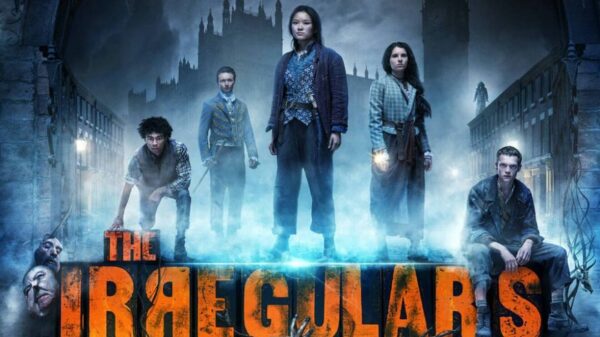The Irregulars season 1 has attracted a range of comments on social media, some highly critical, but we see evidence of potential that we hope the second season might deliver on
We’ve had a few weeks to watch and digest The Irregulars; our conclusion is there are probably too many threads fighting for our attention. With less going on the show might have been far stronger. We’ve reported on the filming of season 2, so our claims of potential are proven before written. That said, we’ll dissect the show as best we can and present its strengths and weaknesses. FYI, at the time of writing, The Irregulars season 1 is showing 77% with critics on Rotten Tomatoes, but only 53% with the audience.
What is The Irregulars season 1 about?
Welcome to Victorian London in the time of Sherlock Holmes and Dr John Watson. Unlike other versions of the Holmes story, but not all, the focus here is on the Baker Street Irregulars (who appeared in only a small number of stories) and were wholly street boys used for intelligence purposes. Of course, here they are now a more diverse and the group starts as a set of ex-workhouse teens, scratching a living from a cellar. Enter a new character, Leo. The group are approached by Dr Watson to help with some cases for money, but his motives are not clear, and he lives in 221B Baker Street with a largely unseen Sherlock Holmes.
And there’s more…
On its own that might make a series, but there’s more: the supernatural is real and it is the source of a number of macabre murders and horrifying events requiring special care when investigating. Oh, and did we mention Leo is (secretly) Prince Leopold, Queen Victoria’s hemophiliac son? Plus, the world might be about to end. Even at this point alarm bells were ringing about how much world-building and character exploration this might require to do it justice.
Who is everyone?

The leader of the Irregulars is Bea (Thaddea Graham), determined, confident and with a strong sense of right and wrong. She’s protective of her younger sister Jessie (Darci Shaw) who at fifteen worries she might be going mad like their mother did before she died.
Billy (Jo Jo Macari) is the fighter who loves Bea but hasn’t told her. Last of the initial group is Spike (McKell David) who relies on his wits and charm and is (very) fond of Jessie.
Leo (Harrison Osterfield) is the prince who wants to be normal, loves Bea and while not a fighter, has a lot of knowledge the others don’t. He’s also based on a real historical figure (and worth five minutes study).
As to Dr John Watson (Royce Piereson), he starts as mysterious but dark, moves to dark and sinister then through to deeply flawed. Sherlock (Henry Lloyd-Hughes), when he eventually surfaces, starts as deeply flawed and ends deeply flawed.
There’s an extent to which London itself is a character, and this is one thing the show does exceptionally well. It’s filmed in Liverpool, and gets a lot of use out of a small number of sets, but the panoramas of London (OK, CGI) are wonderful and bring a certain charm to the adventures.
What’s the story?

Here it gets complicated, and not to the show’s benefit. There’s no reason not to have disparate interwoven threads and the result here is the show never quite finds a rhythm.
Looking at action, there’s a pattern of supernatural mystery of the week. It needs solving, and a little like the Scooby gang, the Irregulars go charging in. These are generally pretty decent, with oodles of blood / death / horror but solved all too suddenly. The show could do better than have Leo happen to pick up a random book to read two scenes before it gives the answer to the latest mystery.
We do also find out Jessie isn’t going mad, but actually has special abilities which help (albeit at some personal risk) her also solve crimes. As we said, these core episode stories are well-conceived, and it’s almost work the price of admission to watch Anna Maxwell Martin going over-the-top when she appears.
Add to this a developing realisation of a connection to the events of Bea and Jessie’s mother’s death, plus Watson and Holmes, and there’s a fair amount happening.
Less impressive is the series arc. Who is behind the sudden appearance of supernatural powers? Is there a link to the rush of mysteries from fifteen years earlier? Who are Jessie’s dreams about? What is Watson’s motive? Can Holmes survive at all without drugs? Where is the source of power? How do they stop it before a wave of violence destroys London?
And there’s even more…
It all never quite convinces, things get blackest before the end (as the classic story arc tells us they should), but there’s a feint, an enemy suddenly disposed of (with a possible pointer to a villain for later), surprises and sacrifices, love and sorrow.
We also fit in the romance between Bea and Leo and here the series could have done more. We get a little class divide / poverty vs royalty / duty / state marriage responsibilities and other tropes and it could be explored better. There’s not enough build up to the group probing just who Leo is.
We do get some well developed back story for Billy and in the end Spike is least developed in terms of history. There’s a lot more bubbling under (Mycroft appears in a couple of episodes) and there’s not enough time to sell backstory and new story. This isn’t the only series to fall foul of this problem, but is certainly overwhelmed at times.
There are plenty of decent performances from (though Sherlock’s character is constrained by the setup) and the show’s post-production is good as well.
Overall
It’s easy to write The Irregulars off as muddled, a series needing better control, but we think it’s a (very) rough diamond. While a lot of the scripts would benefit from a little more polish, we do feel some shows are so sharply focused that they lose some of their intrinsic charm. Underneath the erratic detective stories, curious supernatural elements and Victorian squalor (though fairly clean and white toothed), there is a charm here a more rigorous treatment might destroy. Had it tried to do a little less, we suspect it would have succeeded better.
We look forward to seeing if the show can develop in season 2. Watch for yourself on Netflix and let us know what you thought in the comments.
![]()

